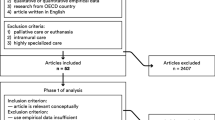Abstract
The current investigation is a planned, systematic study of dignity as critical to understanding the experience of homelessness and improving services and programs for the homeless. Specifically, we conducted a thematic content analysis of interviews with 24 homeless men and women to identify their perception of specific environmental events that validate and invalidate dignity. In addition, we explored the impact that these events have on homeless persons. Eight types of events were identified that sustain dignity such as being cared for by staff and having resources available to meet basic needs. Eight types of events were found that undermine dignity, such as being yelled at or insulted by staff persons and having staff use rules in an excessive and arbitrary way. Two outcomes followed the sustenance of dignity including increased self-worth and motivation to exit homelessness. Three outcomes followed the undermining of dignity including anger, depression, and feelings of worthlessness. The results suggest that dignity is an important variable to consider in understanding the experience of homelessness. Policies and programs that support validating the dignity of homeless persons are encouraged.
Similar content being viewed by others
REFERENCES
Ayers, W. (1989). The good preschool teacher. New York: Teachers College Press.
Banyard, V. L. (1996). Taking another route: Daily survival narratives from mothers who are homeless. American Journal of Community Psychology, 23, 871–891.
Bartunek, J., & Louis, M. R. (1996). Insider/outsider team research. Thousand Oaks: Sage Publications.
Berger, P. L., Berger, B., & Kellner, H. (1974). The homeless mind. New York: Vintage Books.
Berube, M. S. (1994). American heritage dictionary (3rd ed.). New York: Laurel.
Blasi, G. L. (1990). Social policy and social science research on homelessness. Journal of Social Issues, 46, 207–219.
Breton, M. (1984). A drop-in program for transient women: Promoting competence through the environment. Social Work, 11, 47–61.
Buckner, J. C., Bassuk, E. L., & Zima, B. T. (1993). Mental health issues affecting homeless women: Implications for intervention. American Journal of Orthopsychiatry, 63, 385–399.
Folkman, S. (1984). Personal control and stress and coping processes: A theoretical analysis. Journal of Personality and Social Psychology, 46, 839–852.
Foscarinis, M. (1991). The politics of homelessness: A call to action. American Psychologist, 46, 1232–1238.
Foster-Fishman, P. (1994). The influence of organizational culture on the adoption and implementation of an empowerment philosophy. Unpublished doctoral dissertation, University of Illinois at Chicago, Chicago, IL.
Foster-Fishman, P., & Keys, C. B. (1997). The person-environment dynamics of employee empowerment: An organizational culture analysis. American Journal of Community Psychology, 25, 345–370.
Gewirth, A. (1992). In M. Meyer & W. A. Parent (Eds.), The constitution of rights: Human dignity and American values. Ithaca: Cornell University Press.
Golden, S. (1992). The women outside: Meanings and myths of homelessness. Berkeley: University of California Press.
Gounis, K. (1992). The manufacture of dependency: Shelterization revisited. The New England Journal of Public Policy, 8, 685–693.
Grunberg, J., & Eagle, P. F. (1990). Shelterization: How the homeless adapt to shelter living. Hospital and Community Psychiatry, 41, 521–525.
Huttman, E., & Redmond, S. (1992). Women and homelessness: Evidence of need to look beyond shelters to long term social service assistance and permanent housing. Journal of Sociology and Social Welfare, 19, 89–111.
Keys, C. B., & Frank, S. (1987). Community psychology and the study of organizations: A reciprocal relationship. American Journal of Community Psychology, 15, 239–251.
Keys, C. B., Henry, D., & Schaumann, L. (1997). Using values-based job analysis to reduce staff turnover: An organizational culture case study. In M. Montero (Ed.), Psychology and community (pp. 253–253). Proceedings of Community Psychology at the Twenty-fifth Interamerican Psychology Conference. University of Central Venezuela, Caracas.
Kingry-Westergaard, C., & Kelly, J. G. (1990). A contextualist epistemology for ecological research. In P. Tolan, C. Keys, F. Chertok, & L. Jason (Eds.), Researching community psychology: Issues of theory and methods. Washington, DC: American Psychological Association.
Lazarus, R. S., & Folkman, S. (1984). Stress, appraisal, and coping. New York: Springer.
Lincoln, Y., & Guba, E. (1985). Naturalistic inquiry. Beverly Hills: Sage Publications.
Maslow, A. H. (1962). Toward a psychology of being. New York: Van Nostrand.
McChesney, K. Y. (1990). Family homelessness: A systemic problem. Journal of Social Issues, 46, 191–205.
Miles, M. B., & Huberman, A. M. (1994). Qualitative data analysis. Thousand Oaks: Sage Publications.
Rappaport, J. (1981). In praise of paradox: A social policy of empowerment over prevention. American Journal of Community Psychology, 9, 1–25.
Rivlin, L. G., & Imbimbo, J. E. (1989). Self-help efforts in a squatter community: Implications for addressing contemporary homelessness. American Journal of Community Psychology, 17, 705–728.
Schacter, O. (1983). Editorial comment: Human dignity as a normative concept. American Journal of International Law, 77, 848–854.
Seltser, B. J., & Miller, D. E. (1993). Homeless families: The struggle for dignity. Urbana, IL: University of Illinois Press.
Shinn, M. (1992). Homelessness:What is a psychologist to do? American Journal of Community Psychology, 20, 1–24.
Shinn, M., & Gillespie, C. (1994). The roles of housing and poverty in the origins of homelessness. American Behavioral Scientist, 37, 505–521.
Shinn, M., Knickman, J. R., Ward, D., Petrovic, N. L., & Muth, B. J. (1990). Alternative models for sheltering homeless families. Journal of Social Issues, 46, 175–190.
Snow, D. A., & Anderson, L. (1987). Identity work among the homeless:The verbal construction and avowal of personal identities. American Journal of Sociology, 92, 1336–1371.
Snow, D. A., & Anderson, L. (1993). Down on their luck: A study of homeless street people. Berkeley: University of California Press.
Stark, L. R. (1994). The shelter as “total institution.” American Behavioral Scientist, 37, 553–562.
Tesch, R. (1990). Qualitative research: Analysis types and software tools. New York: The Falmer Press.
Author information
Authors and Affiliations
Rights and permissions
About this article
Cite this article
Miller, A.B., Keys, C.B. Understanding Dignity in the Lives of Homeless Persons. Am J Community Psychol 29, 331–354 (2001). https://doi.org/10.1023/A:1010399218126
Issue Date:
DOI: https://doi.org/10.1023/A:1010399218126



